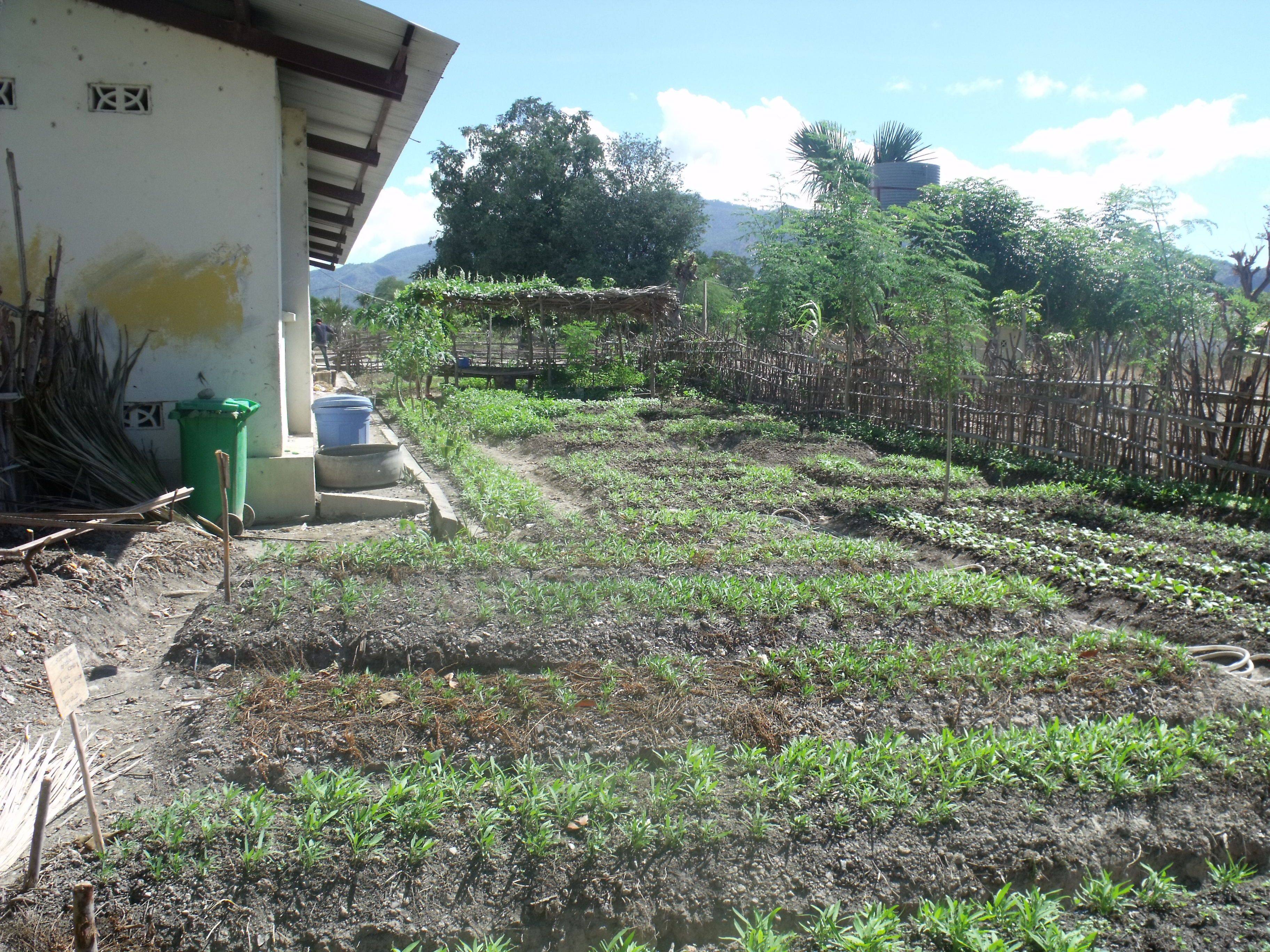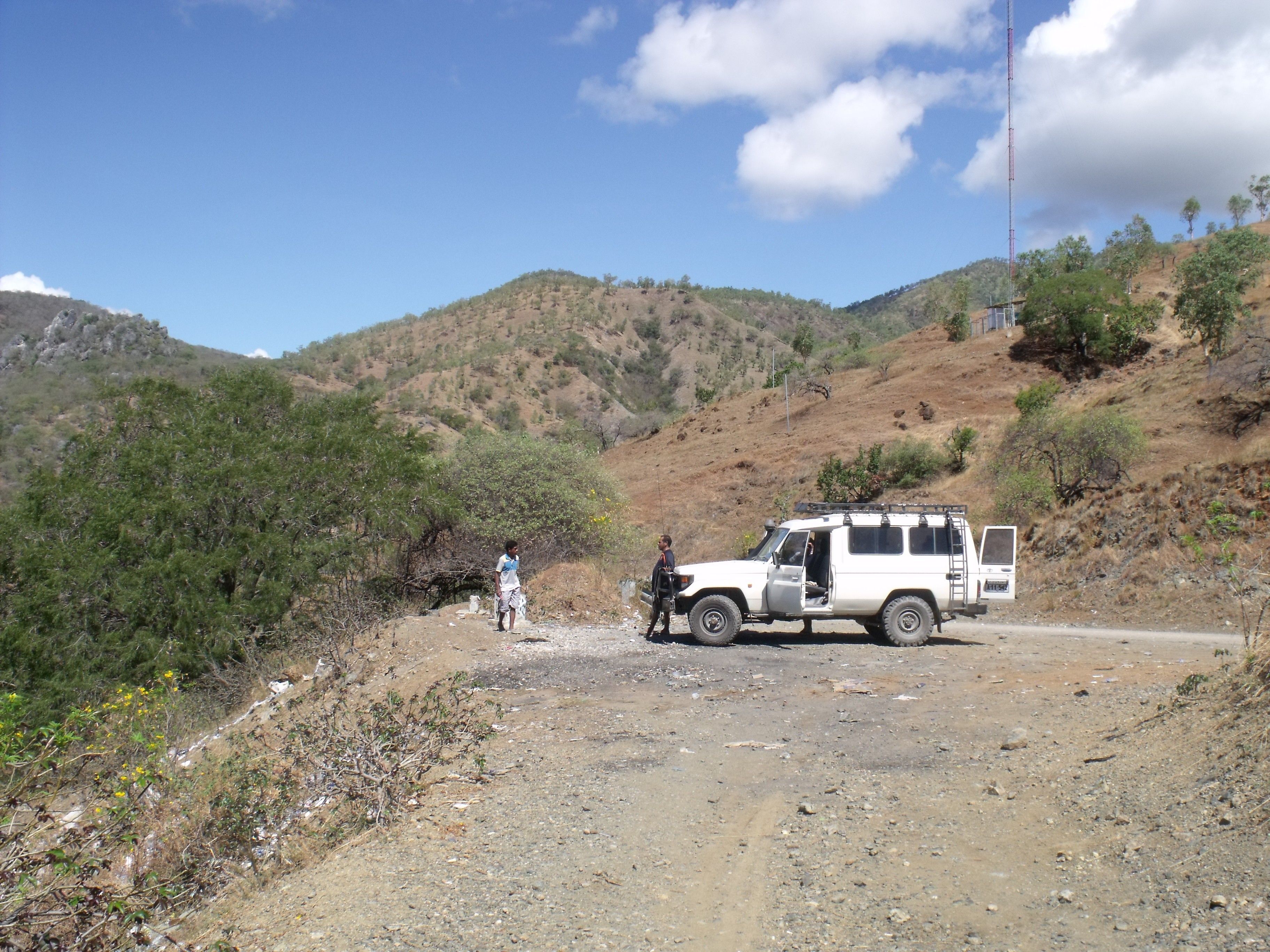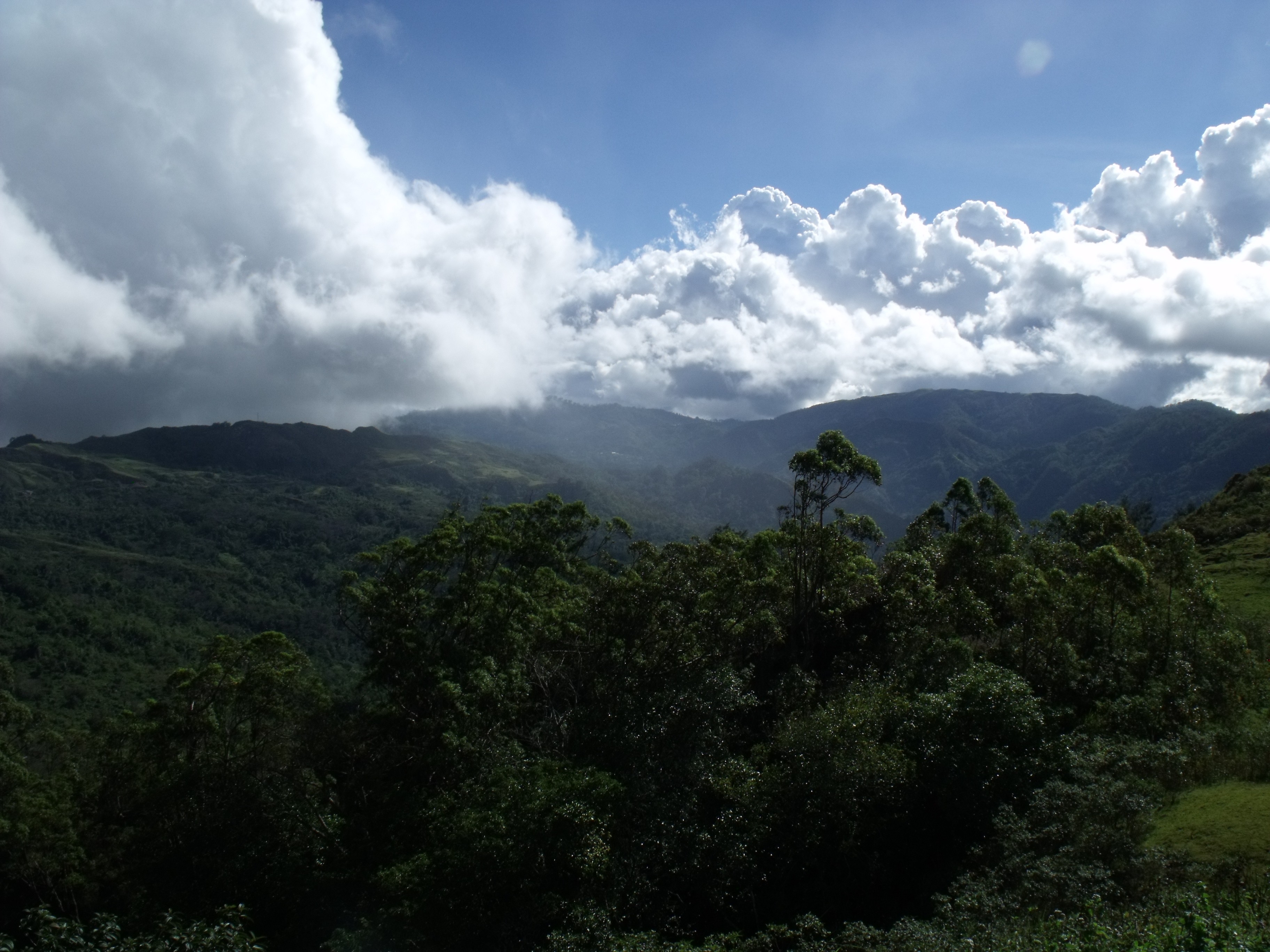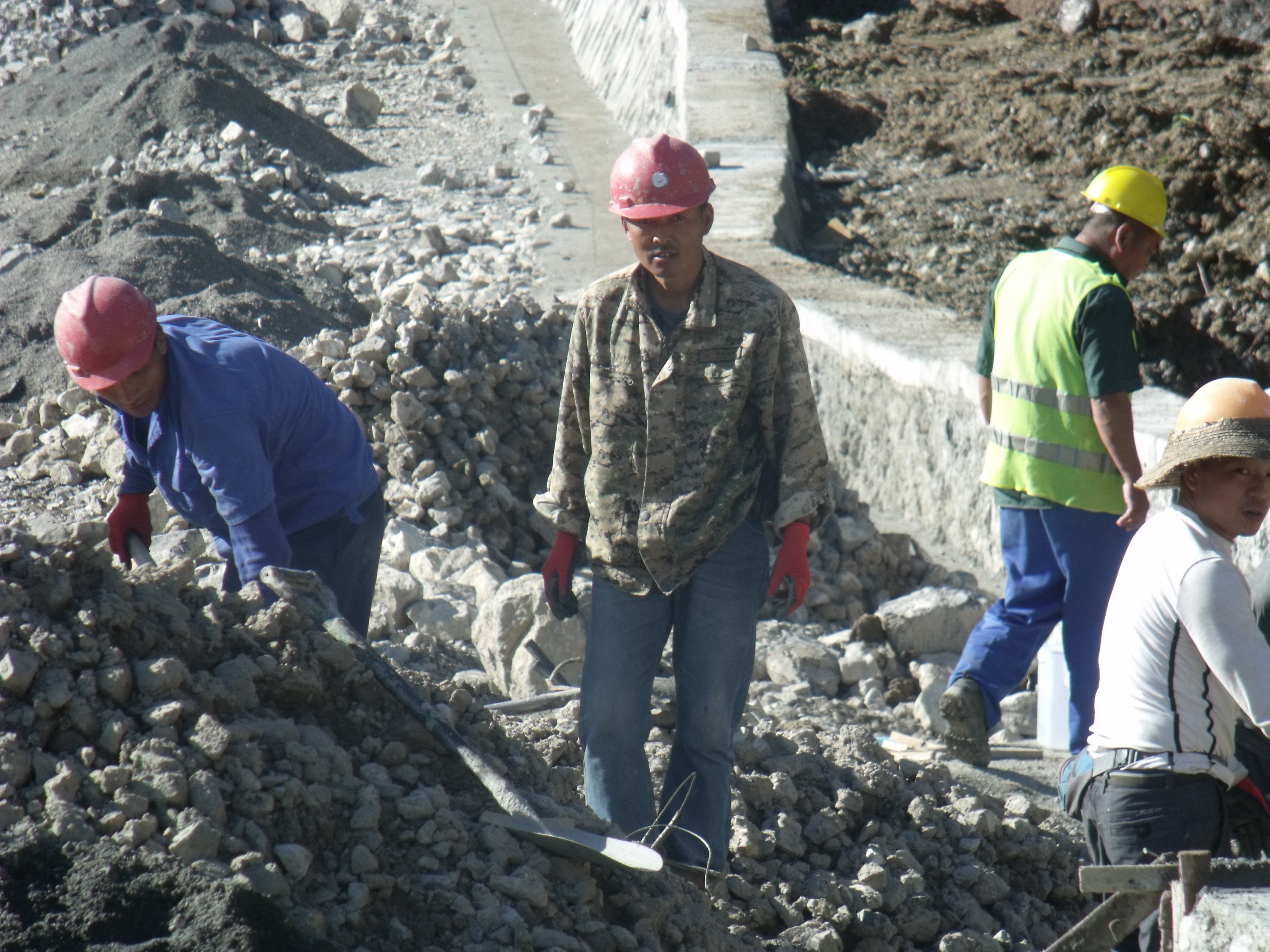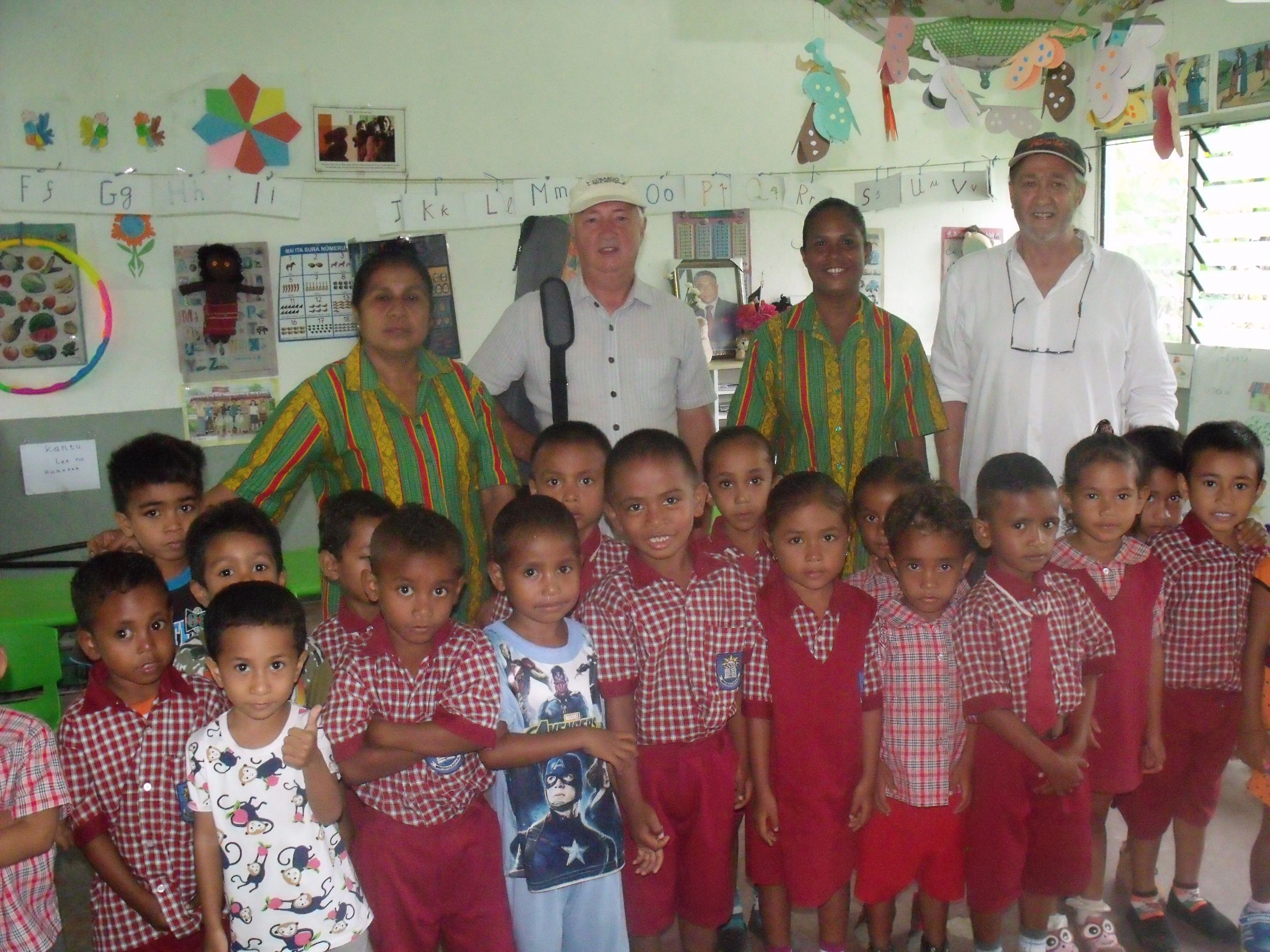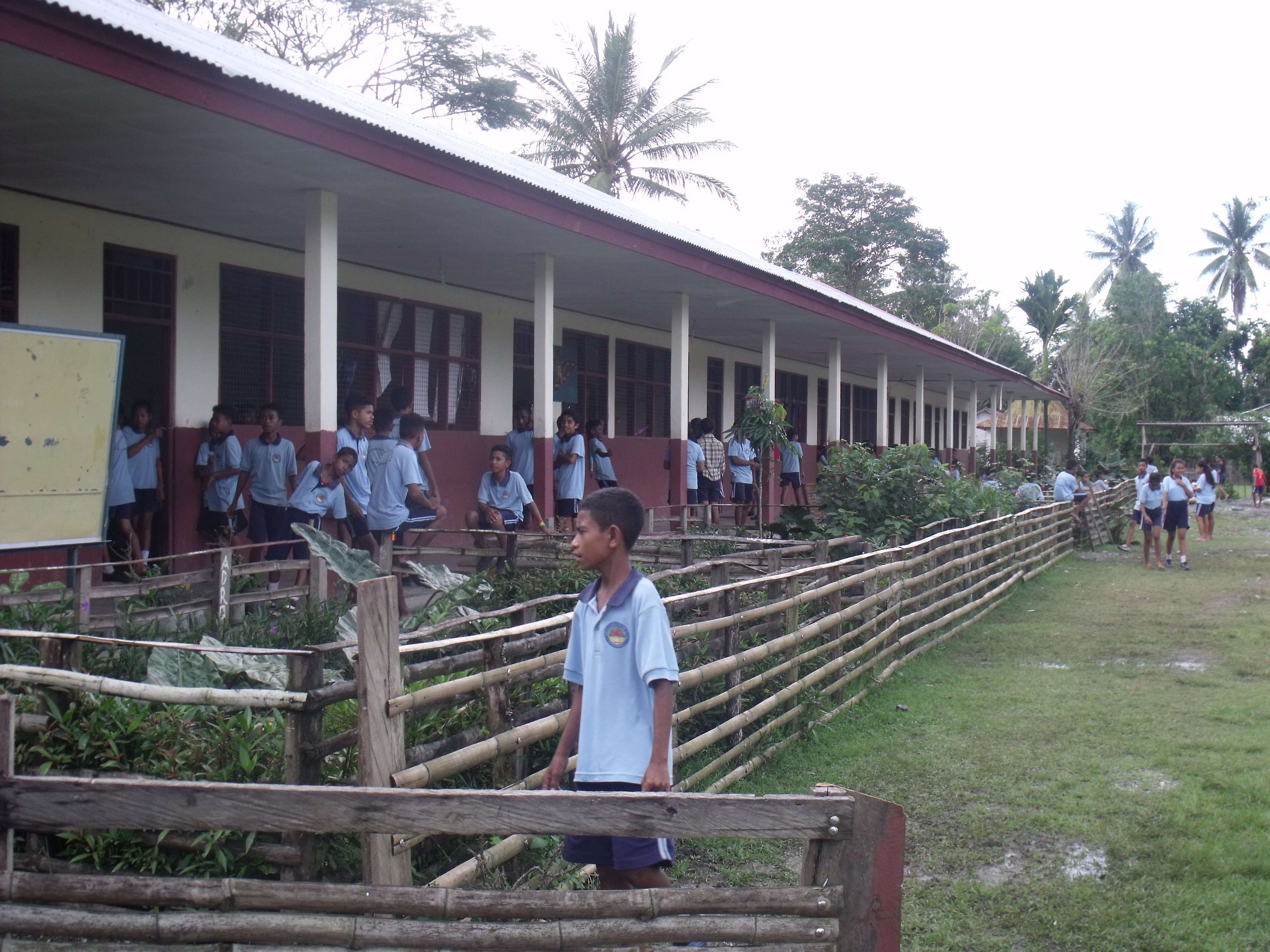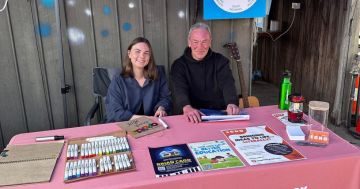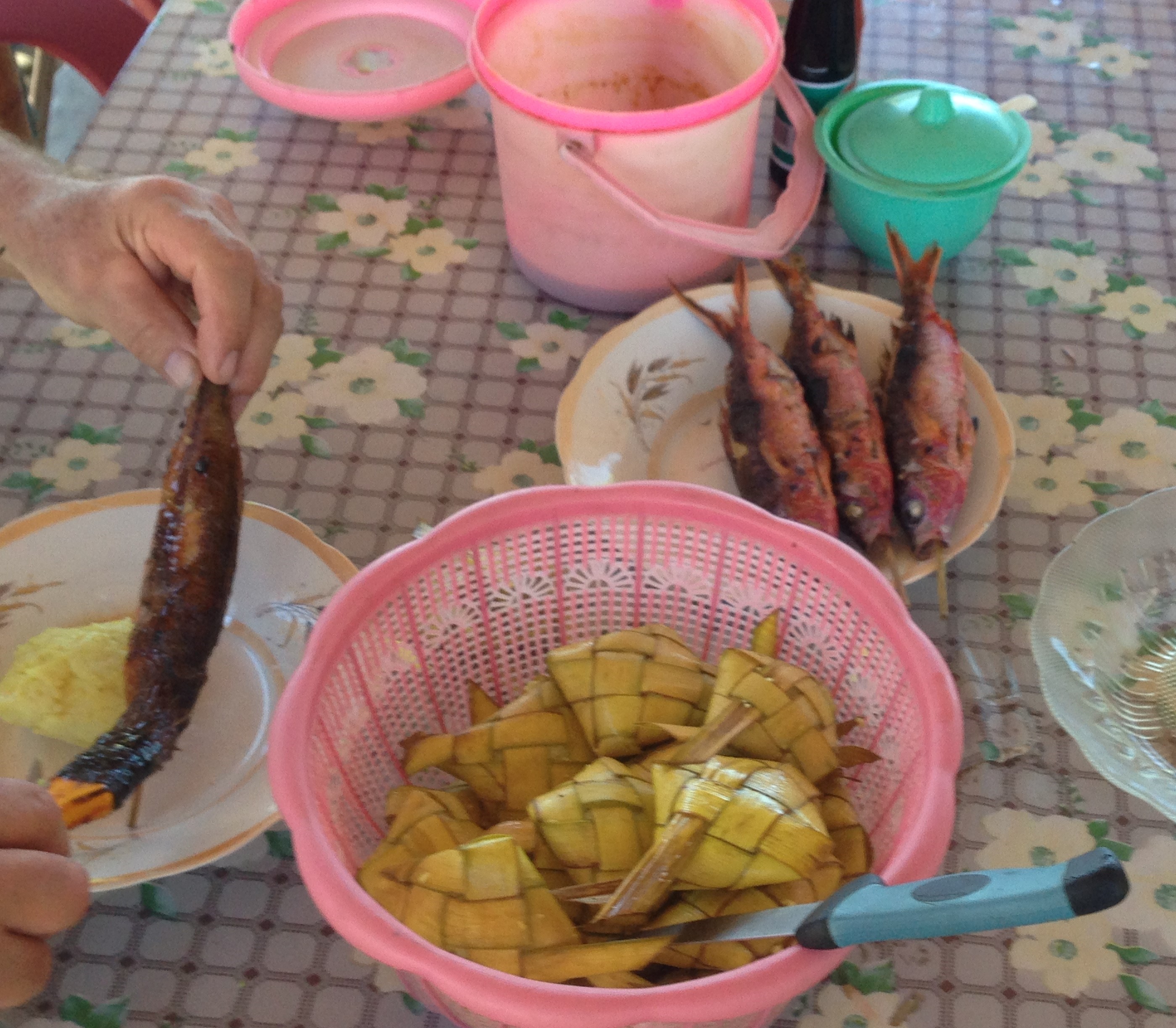
Lunch -delicious small redfish with a chili basting, rice ice in banana leaves and a thermos of black coffee. Photo: Tim Holt
Wednesday dawns, I’ve woken early to the deep throated chanting from the nearby mosque that melds into early morning prayer and song from the Catholic Sisters at Fatuhada.
Ahead lies the 150 kilometres to Natarbora, it doesn’t sound far, but from Dave’s experience, it will be a long and painful trip. This morning though we are feeling somewhat reassured that conditions have improved.
Last evenings conversation with Ego had intimated that the road was now “really good” and our journey would take far less time than in the past.
I have visions of smooth tar and an easy run to Natarbora.
First task of the day though is to collect two sewing/overlocker machines that Augus and I will share company with in the back of the Toyota. The machines are for the sewing group at Uma Boco and had been requested by Nikolas Klau, the Bega Valley Advocates for Timor Leste coordinator in Natarbora.
With the machines, our bags, guitar and other instrument cases, it’s a tight squeeze for Augus and me in the Land Cruiser troop wagon, but hey, the road ahead will be smoother than a …!
With Jose at the helm we head out of Dili east along the coast towards Manatuto, the road is mostly good, but well before our lunch break, it deteriorates.
As we climb over the coastal hills the road can only be described as appalling.
We stop for lunch at one of the seaside food stalls, delicious small redfish with a chili basting, rice ice in banana leaves and a thermos of black coffee. I could get very used to this!
Ego Lemos had invited us to check out the Permaculture school garden at Manatuto primary, so we take a minor detour to have a look at their progress and to take some photos. And it is impressive, despite being winter and the dry season.
From Manatuto we head over the mountain and the interior to the south coast, the vegetation changes along the way.
It is the dry season and everywhere on the north side of the island, it is dry, very, very dry. Vegetation is sparse, the steep hills brown, the rocky soil exposed by the predation of goats and the never-ending cycle of firewood collection, only to be further eroded by the torrential downpours of the wet season.
The transformation southwards through the mountains is dramatic, increasingly lush and tropical.
The air is moist and cooler, the humidity bearable. The sheer beauty of the mountains as they rise and fall into beautiful valleys is simply breathtaking.
Since we arrived in Timor it has been overcast, thick and humid and always a smoky haze – everywhere the acrid smell of wood fired cooking.
Here through in the interior, it feels like a different world.
One thing that can be said about the roads in Timor Leste is that they will one day be very good.
But not now. Across the country, all the major roads are being rebuilt, and not just a kilometre at a time.
All the way along the coast, thru the interior to Natarbora on the south side of the island, construction workers are doing major drainage works – massive drains with concrete and stone retaining walls the entire length of the road.
I lose count of the new bridges, there must be thousands of metres of concrete being poured.
It is labour intensive, backbreaking work. The Chinese have the contacts for the road reconstruction program in Timor Leste, some hundreds of millions of dollars.
There are Timorese amongst the road gangs but it seems there are mostly Chinese workers and I have little doubt that this is a cause of tension for the unemployed here.
I’m told the Timorese working as concrete labourers are paid five dollars a day!
While this work continues, the road surfaces have yet to be prepared. In the Toyota it’s like traveling on bumpy, corrugated, vibrating roller coaster. My body and the two sewing machine/overlockers will be requiring some restorative adjustment when we reach Natarbora.
About twenty kilometres or so out of Natarbora as we pass yet another construction crew we get a heart warming surprise.
Several of the young construction workers are Timorese, and as we pass they recognise Jose and the white Toyota.
“Hey…Bega Valley…Bega Valley,” they yell, waving and smiling.
After almost nine hours traveling on what must come close to being one of the worst roads in the world, nothing could have raised my spirits more.
It speaks volumes to the vision and dedication of Jim and Moira Collins and the Bega Valley Advocates. It’s a humbling moment for me to appreciate just what that ongoing commitment and friendship means for the people here in Natarbora.
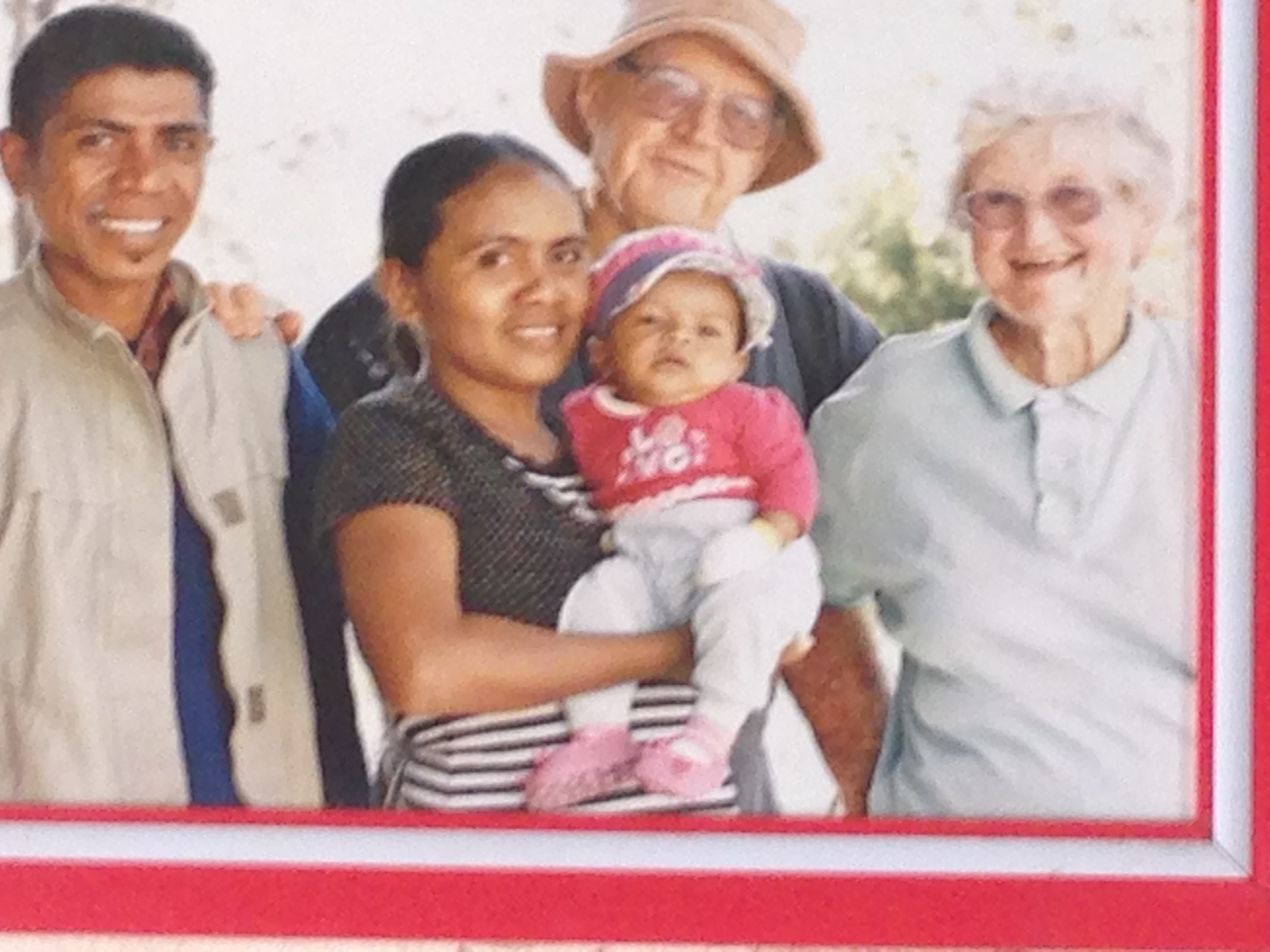
Jose de Costa, his partner Lucy and their eldest daughter Moira, named after Moira Collins, pictured here with husband Jim. Both founding members of the Bega Valley Advocates for Timor Leste. This photo hangs on Jose and Lucy’s wall. Photo: Tim Holt
Late afternoon and the storm clouds are gathering if it’s at all possible the road deteriorates even further.
The several kilometres before the Uma Boco intersection was fantastic, but the road into Uma Boca is still the worst bit of the worst road in the world!
When we arrive at the Franciscan Convent, Nikolas Klau and his son Brian are there to meet us.
Brian had spent a year in the Bega Valley, attending the Sapphire Coast Anglican College and he was keen to catch up and reminisce with Dave.
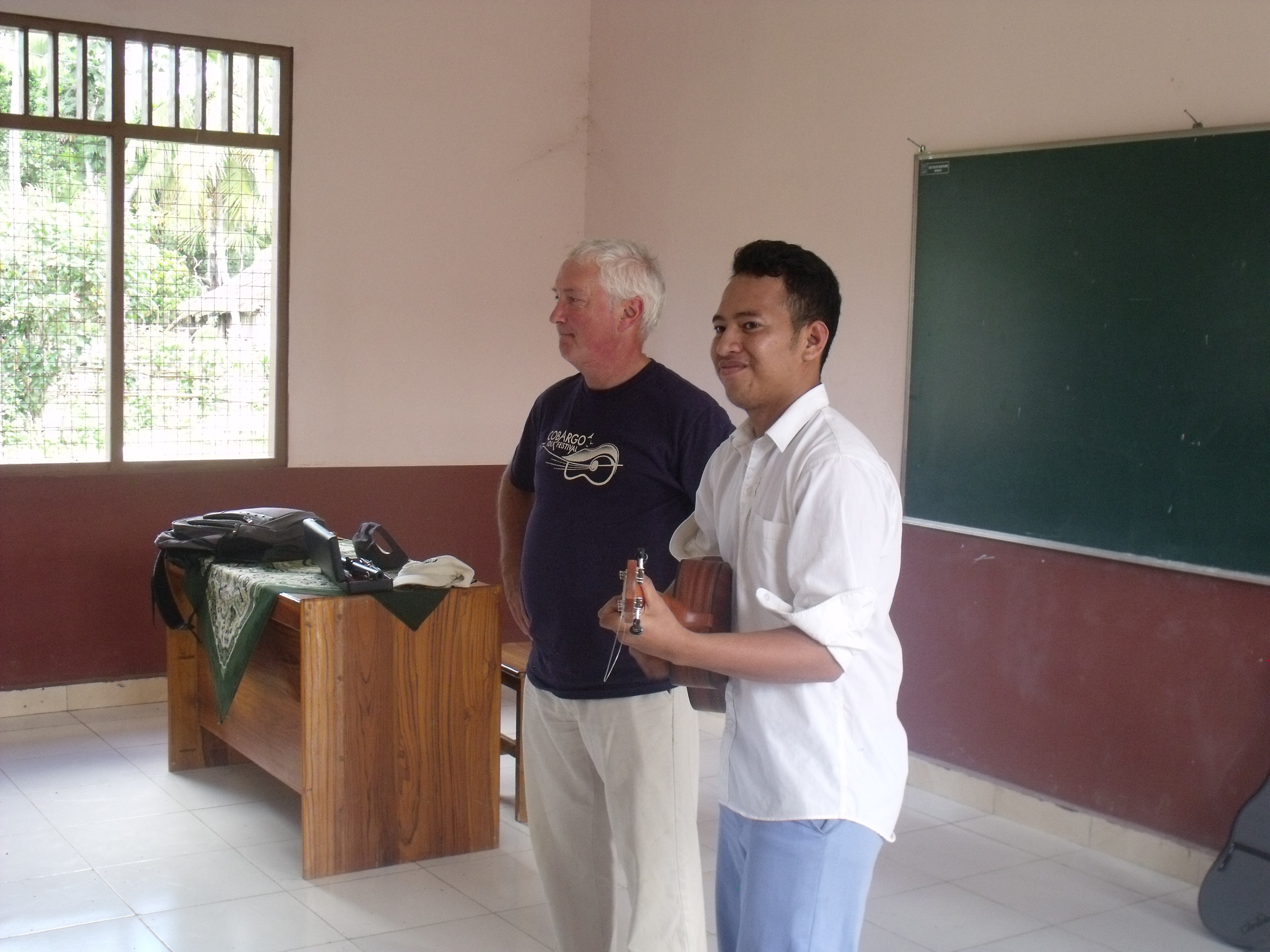
Dave Crowden with Brian Klau who spent time at Sapphire Coast Anglican College in Bega. Photo: Tim Holt
We’re not the only guests at the convent and over another typically delicious Timorese dinner prepared for us by the Sisters, we meet several health workers – Basilio Martens and Jose de Costa, who are visiting several of the communities in and around Natarbora.
After dinner, Jose and Augus head off to spend the night with friends in Uma Boco, Dave and I retire to our rooms. I fall to sleep to the sound of rain.
Thursday and it’s wet, and it’s a fuller load in the Toyota this morning, Nikolas has joined us for the school visits, so there are five of us in the wagon plus the two overlockers. The first task of the day is to unload the machines at the resource centre for the sewing group.
Today we visit three schools, Uma Boco Kindergarten, Junior High School and Ametalaren Primary. The musical experience with the children at all the schools we visit over the two days is an absolute delight, so enthusiastic and joyful.
Experiencing the conditions, the paucity of resources and the challenges the teachers face is sobering. There are no computer rooms, or libraries, the classrooms are basic and in need of repair. The teachers share one staff room. The only books in the “library” we saw are textbooks for the students and teachers.
Despite this, the teachers and students are just so enthusiastic. As Jose says, “Education is number one for the future of the Timorese,” and this is where the Advocates have put all their emphasis.
Several years ago the Advocates set up a resource and training centre for the professional development of teachers and the community.
The advocates also support trainee teachers thru scholarships that enable them to study a Bachelor of Education at the Baucau Institute, East Timor’s main teacher education facility.
So far 43 teachers have graduated from the professional development program, another five are doing their teacher training now and a further four graduated at the beginning of this year (2017), they are now completing internships in Natarbora.
The significance of the support the Advocates are giving in this area cannot be understated. It is a huge contribution and deserving of far more support, both financially and on the ground.
Mid-afternoon we pay a visit to Carlos to see if he can be persuaded to play a leadership role in the choir project I mentioned in postcard three.
Carlos was a member of Koro Loriko, the Timorese choir formed by Ego Lemos that came to Australia in 2012 to perform at the Melbourne Millennium Chorus and Boite Schools’ Chorus concerts.
Carlos is now married with a small family and making a living as a builder.
We while away an hour or so with Carlos singing and playing a few tunes.
Music does not pay the bills for his family in Timor, despite Carlos being a prodigious talent. It seems a great shame that his tunes are unlikely to ever reach a wider audience.
It’s around four in the afternoon now as we make our way back to the Uma Boco Resource Centre, where the sewing group is in action.
There are patterns from the Advocates and quite some excitement with the delivery of the overlockers.
Dave and I are warmly welcomed by the group and presented with some beautiful examples of their work to bring back to Bega.
It’s also an opportunity the setup and test the PA, mixer, and amp that were donated by the Advocates for concerts and performances.
It doesn’t take long before one of the lads pulls out a guitar. We turn on the mics, while Dave fiddles with settings on the amp and mixer and before you know it there’s plenty of voices singing a few of Ego’s songs and a Bob Marley tune or two.
You can never have too much fun here with a guitar and some willing voices, but it’s time to let the sewing group do their thing, so we pack up the gear and head back to the convent for the evening.
Our evening meal is shared with Basilio and Jose from the health team.
After dinner, I fall into a long conversation with Basilio about the health teams work.
Basilio is the team leader and their focus is on a disease that he describes as the “forgotten disease.” Lymphatic Filariasis, also known as Elephantiasis.
It is a parasitic infection caused by worms transmitted to humans through the bite of infected mosquitoes.
Basilio is confident the disease will be eradicated in Timor Leste by 2020.
In ASEAN countries only Indonesia and Timor Leste are reporting cases, but it is here in the south and around Natarbora that the disease remains prevalent.
Ironically it is the wet and lush conditions that favour the district’s agriculture that also provides ideal conditions for both the nematode worms and mosquitos.
The eradication program is being funded thru an aid program being sponsored by the government of South Korea.
Friday morning and there’s early rain, but it clears before breakfast to reveal bright blue skies as the heat builds.
Today, Nikolas will visit Abet Oen Primary and Junior Secondary School. The school gardens are impressive.
Our final school visit is to St Francis School, also with a fabulous school garden.
The beauty of these gardens is that they are adjacent to the classrooms, so they become very much part of everyday activities.
The music session with senior students was particularly enjoyable with Brian Klau, a student here, playing Dave’s guitar and leading the students in song.
The music continued into the night with an invitation to dinner with Nikolas and his family. Sitting around with Jose, Angus, Nikolas and his sons – listening to them laugh, play and sing together you just know that this country has an enormous future.
Saturday dawns and it’s time to say farewell to this wonderful community and the Franciscan Sisters. Each morning I have watched as several of the Sisters head out for their early morning errands on their Honda motor scooters, in full habit with helmet and thongs. Wish I had a photo for you!
Dave and I bid farewell to the wonderful Sisters who have fed us so well, we say our goodbyes to Nikolas, Brian with the promise of a return next year, our luggage stowed aboard the Land Cruiser, along with bags of local produce that Jose is taking back to stock the family larder for the months ahead.
Three bags of the local specialty – Natarbora popping corn and a surprise passenger that I don’t discover until we are halfway to Dili – more about that next time.
Today we will take a different route from the way we came, heading along the coast to Betano, then travel thru the interior via Same and Maubisse.
We will stop at Betano. A significant site in the history between both our nations – more in postcard 5.
Words and pictures by Tim Holt
Catch up on Postcard 1, Postcard 2, and Postcard 3 in Tim’s postcard series from Timor Leste.


